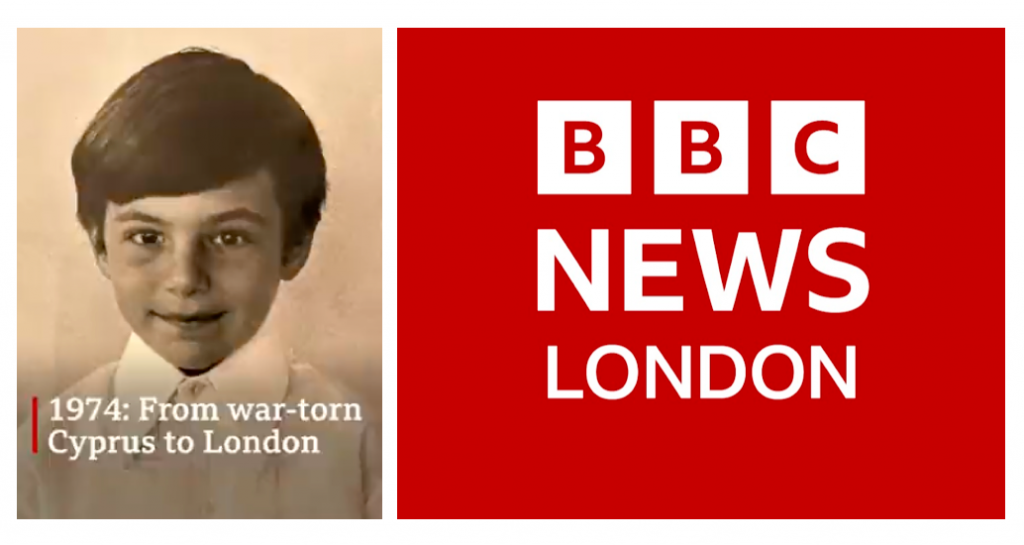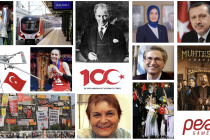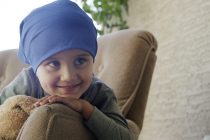Hundreds of Turkish Cypriots have vented their anger online after BBC London broadcast a news clip for the anniversary of the 1974 War in Cyprus, which again vilified Turks.
The 3-minute clip features an interview with a Cypriot family, thought to be Armenian, about how they fled war-torn Cyprus and resettled in Britain as refugees. The clip has been viewed over 13,000 times on Twitter alone – more than ten times the viewing for most BBC London clips.
Baz Bedrossian explains his memories as a nine-year-old boy of the events that led to his family’s move from the Cypriot capital Nicosia to Britain: “I’m Baz, I came to London in August 1974, following the Turkish invasion of Cyprus.”
Describing the move to London as a “traumatic experience”, Baz revisits the family living first in his uncle’s flat in Ealing and then, from March 1975, above a hair salon in Richmond, where his hairdresser mother worked.
Baz and his parents go on to tell their tale about their new lives in London, running a business, becoming home owners and with Baz starting his own family. His father said they had come from “hell to heaven”.
At the end of the clip, there is more footage of the devastation of Cyprus from the 1974 war, as Baz states, “although it was a tough time, what has happened since, in the last 48 years, I can only feel blessed as part of a family that obviously came here as refugees.”
While no one disputed Baz and his family’s right to tell their story, Turkish Cypriots were severely irked that the BBC story again unfairly vilified Turkiye, describing as an “invasion” its intervention in Cyprus 1974.
The nine-year-old boy that fled Cyprus in August 1974 and made London his home. 48 years ago Baz and his family arrived as refugees, following the second Turkish invasion of Cyprus, and have since made a life for themselves in the capital.
Read more: https://t.co/UacWFraE7y pic.twitter.com/72LarOqjeg
— BBC London (@BBCLondonNews) August 15, 2022
Turkish Cypriots regard Turkiye’s military intervention as a lifesaving action, saving them from annihilation at the hands of EOKA-supporting members of the larger Greek Cypriot community. Multiple mass graves were discovered after the war ended in August 1974.
The action was also judged legal under the 1960 Treaties that led to the formation of the Republic of Cyprus, as Turkiye is one of three Guarantor Powers with the right to intervene unilaterally to protect the Turkish Cypriot community. Of the other two Guarantors. Britain refused to act at the time, while Greece had triggered the action by backing a coup to topple President Makarios on 15 July 1974.
Many took to social media to ask why the BBC only featured Baz’s story on such a sensitive anniversary and failed to feature one from the Turkish side, that could have offered much needed balance.
Singer-songwriter Japha Huse tweeted: “By all means, tell the story of this man and his family. *By all means*. But don’t perpetuate the Cyprus problem by telling ONE SIDE. What happened the week before Turkey’s arrival? What happened during the whole decade previous? Where are the Turkish Cypriot stories?”
By all means, tell the story of this man and his family. *By all means*.
But don’t perpetuate the Cyprus problem by telling ONE SIDE.
What happened the week before Turkey’s arrival? What happened during the whole decade previous?
Where are the Turkish Cypriot stories?
— Japha (@JaphaOfficial) August 15, 2022
Suzanne Nuri-Nixon, a councillor of Turkish Cypriot origin, said: “Poor reporting. As others have said focus on one family if you like but acknowledge two civilian populations suffered. My Turkish Cypriot grandparents, aunts, uncles and cousins were all displaced due to the actions of Greek Cypriots but at least they lived on, many didn’t!”
Poor reporting. As others have said focus on one family if you like but acknowledge two civilian populations suffered. My Turkish Cypriot grandparents, aunts, uncles and cousins were all displaced due to the actions of Greek Cypriots but at least they lived on, many didn’t!
— Cllr Suzanne Nuri-Nixon🔶🇬🇧🇪🇺🇹🇷🇺🇦🏳️🌈😷 (@claphamturk) August 15, 2022
Trade unionist Fevzi Hussein told the BBC in a tweet that it had “failed miserably” in its coverage on Monday:
“There’s a huge responsibility to be balanced & factual when reporting on Cyprus especially when referencing the conflict. You’ve failed miserably & only served to perpetuate existing division. The story itself is lovely and we wait to see stories of other affected ethnic groups.”
There’s a huge responsibility to be balanced & factual when reporting on Cyprus especially when referencing the conflict. You’ve failed miserably & only served to perpetuate existing division. The story itself is lovely and we wait to see stories of other affected ethnic groups
— Tune into BANDOFLA – A Socialist Platform (@_Bandofla) August 15, 2022
Racism guiding editorial bias
— Ertan Karpazli (@Ertan_Karpazli) August 15, 2022
Journalist Ertan Kapazli said the BBC story showed: “Racism guiding editorial bias”.
The BBC have been approached for comment.




